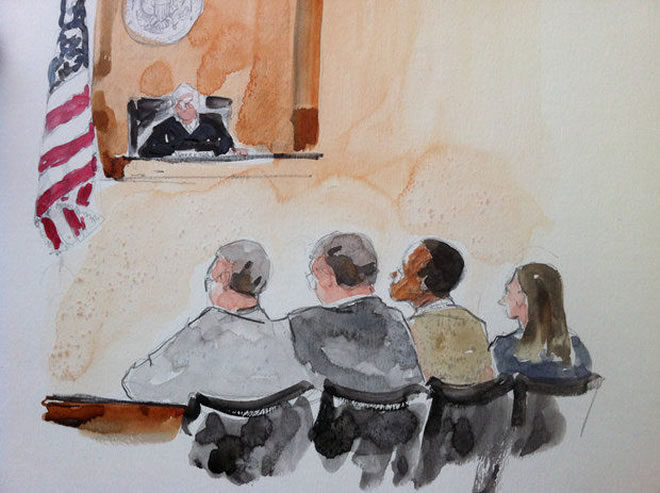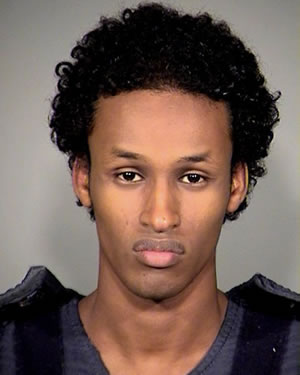
Mohamed Mohamud was convicted in January 2013 after less than seven hours of deliberations. Lawyers for Mohamud (second from right) are seeking additional documents two months after prosecutors admitted for the first time that they relied on evidence obtained under the Foreign Intelligence Surveillance Act in building their case against him. (Deborah Marble/for The Oregonian)

Helen Jung | [email protected]
Tuesday, January 14, 2014
The memorandum, filed in U.S. District Court on Monday afternoon, comes two months after prosecutors admitted for the first time that they relied on evidence obtained under the Foreign Intelligence Surveillance Act in building their case against Mohamud.
The Somali-born man was found guilty of trying to set off a bomb at Pioneer Courthouse Square during the 2010 holiday tree-lighting ceremony attended by thousands. The bomb, supplied to him by undercover agents, was a fake.
Federal prosecutors’ belated disclosure violated the act’s requirement to alert the defense, Mohamud’s attorneys said, and deprived them of the chance to challenge the evidence and the circumstances under which it was obtained.
In addition, they said, the prosecution appears to have withheld such information from the judge overseeing the case, which may have affected how the judge ruled on numerous issues. For example, the court filing states, U.S. District Judge Garr King allowed two undercover operatives to testify at Mohamud’s trial under fake names, curtailing the defense’s ability to investigate their identity.
The belated revelation two months ago that the government obtained evidence under FISA and its related amendments triggered King to postpone the planned December sentencing for Mohamud.

Mohamed Mohamud
Multnomah County Sheriff's Office
Mohamud’s case is one of several in which defendants are being told after-the-fact that they were prosecuted with evidence derived under FISA, the memorandum states. It also comes amid a national intelligence-gathering debate sparked by former National Security Administration contractor Edward Snowden’s outing of the NSAs massive collection of Americans’ phone call logs.
“The public record about the scope of government surveillance, the public record about the intelligence community’s failure to be forthcoming with courts or trial prosecutors, and the public record of this case raise serious concerns about the fairness of the proceedings that led to Mohamed’s conviction,” the memorandum states.
FISA and its related amendments authorize the government to track people suspected of acting as agents of foreign powers on U.S. soil or eavesdrop on foreigners whose communications are intercepted in the U.S.
The filing, by Federal Public Defender Steve Wax; his chief deputy, Stephen Sady; and Assistant Federal Public Defender Lisa Hay argues that the government should be forced to turn over any and all related documents to the surveillance. The information will assist them in determining whether to seek a new trial for Mohamud or take other actions.
The defense noted several instances in which incomplete information may have affected their case. They questioned how the government first targeted Mohamud and whether that interest in the then-teenage student stemmed from unlawful surveillance.
-- Helen Jung